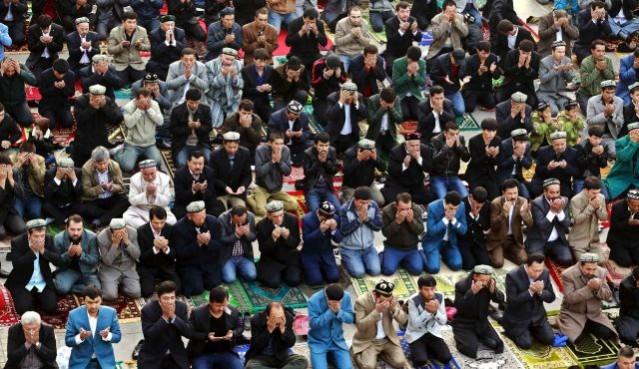
China is taking its open suppression of Islam further. In the latest move, the Chinese Communist Party has launched a crackdown on halal products in its predominantly Muslim region.
The party says the Muslim practice of choosing halal food products is vitiating secular life and fuelling extremism, global media outlets reported.
The party bosses in Urumqi, the capital of the restive Xinjiang region, have asked cadres to swear an oath to "fight a decisive battle against 'pan-halalization', a Reuters report said.
The Xinjiang region is home to the vast majority of China's Muslim population and has been a scene of violent confrontations and brutal crackdowns.
The "demand that things be halal which cannot really be halal" was a means of helping Islam penetrate secular life, a report on state mouthpiece Global Times said on Wednesday.
As part of the anti-halal campaign, the party has issued guidance through an official WeChat account saying government employees should not have dietary preferences based on religion. Eateries at work places would be modified to accommodate all kinds of foods, the report says.
Officials and party members have been instructed to speak only in standard Mandarin public and not engage in any religious activities.
In September, Human Rights Watch (HRW) unveiled further details of China's massive crackdown in the Xinjiang region. The government was engaged in a mass, systematic campaign of human rights violations against Turkic Muslims in Xinjiang HRW said.
As many as 13 million Muslims living in the region are increasingly subjected to mass arbitrary detention, torture and mistreatment by the Chinese government, the report noted.
Crackdown spreading beyond Xinjiang
China's rights crackdown in Xinjiang has a stated objective -- to suppress militancy. Beijing at times went as far as banning the Muslim fasting during Ramadan. The suppression of rights has spread to other regions as well.
The latest measure in Linxia was a soft crackdown, wherein the number of people over 16 who are allowed to study in mosques was cut down. Another action was the introduction of a certification processes for new imams.
Other repressive measures include the instruction to mandatorily display the Chinese national flags on the mosques. The report says that even the daily call to Muslim prayer has been banned. The reason cited is that the use of loudspeakers for the call to prayer or namaz causes noise pollution.
Why Is China Wary Of Muslims?
The imam from Linxia had the answer. "They want to secularise Muslims, to cut off Islam at the roots ... These days, children are not allowed to believe in religion: only in communism and the party."
China is rolling out the newly revised Religious Affairs Regulations. The new laws have increased the punishments for unauthorised religious activities.
There are a million ethnic Hui Muslims in China. They account for half of the communist country's Muslim population. Though they have been well integrated with the ethnic Han Chinese, they have now run into stiffened state regulations that question their existence.
The Hui Muslims of Linxia are aware that they have been caught in the conflict raging in Xinjiang. The Huis aver that they are not like the "bloodthirsty" Xinjiang tribes. The Xinjiang militants have launched terror attacks that killed scores and attracted violent reprisals from the government.








